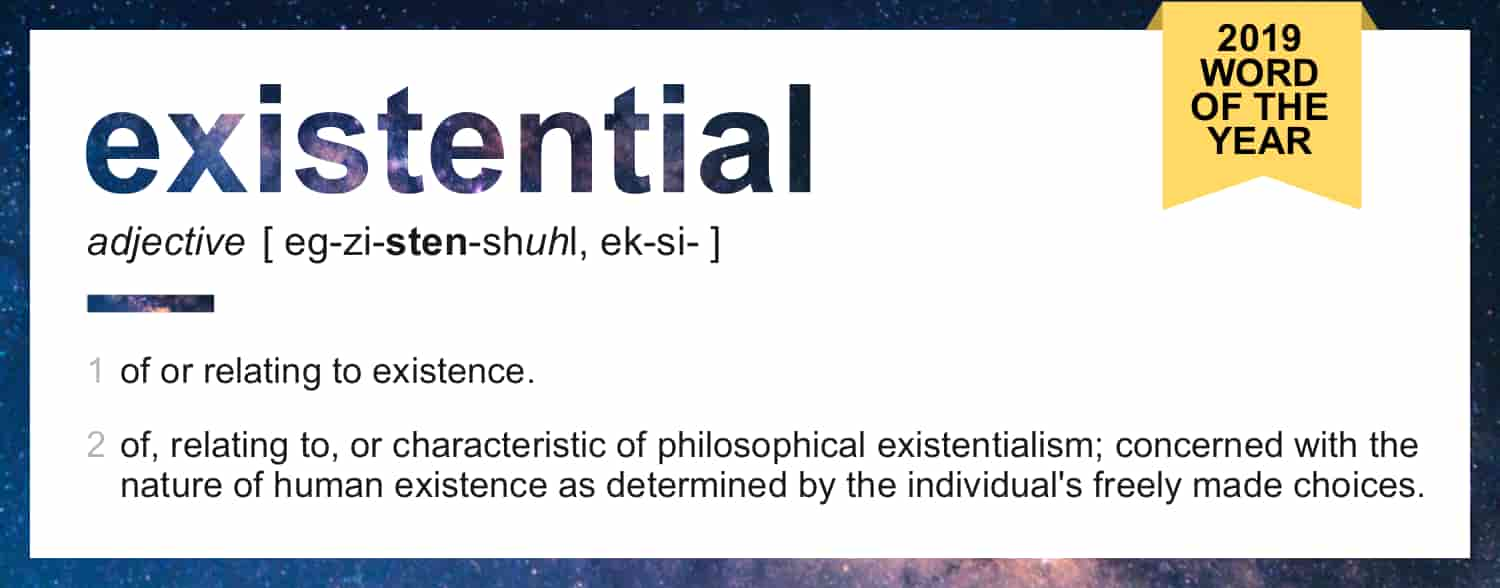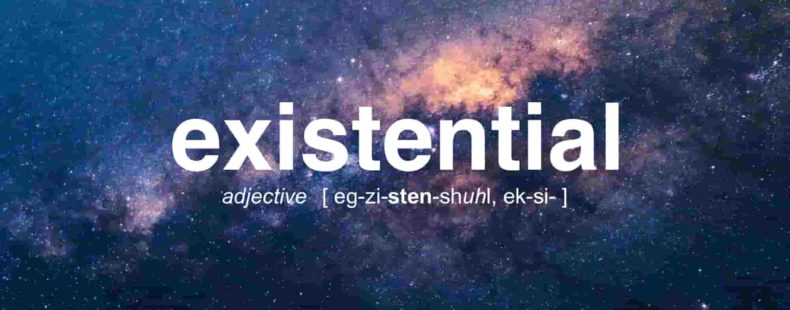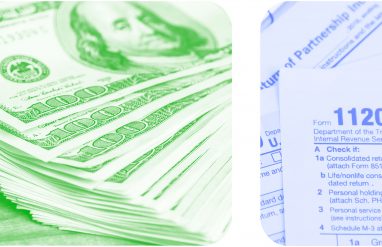Our existence was dramatically affected by the 2020 Word of the Year. Learn all about it here.
WATCH: What Does "Existential" Mean To You In 2019?
From existential threats to existential choices

BY PIXAR
“I’m trash!” was the insistent cry of Forky, the googly-eyed spork whose struggle to be a toy was at the heart of the summer blockbuster Toy Story 4. Forky’s plight was entertaining, yes, but it also resonated with a deeper sentiment—and word—that defined so much of 2019.
We know what you must be thinking: Forky? The dictionary? 2019?
Well, the thing about Forky is, his dilemma actually speaks to a broader theme of threat and crisis reflected not only in culture and news, but also in our dictionary work throughout this year. High-stakes events around the world involving climate change, gun violence, and democratic institutions were some of the top news stories. And words about these events, from polar vortex to stochastic terrorism to exonerate, were top searches and trends on Dictionary.com.
Notable among searches was existential, which we’ve chosen as our Word of the Year for 2019. It captures a sense of grappling with the survival—literally and figuratively—of our planet, our loved ones, our ways of life.
Yep, heavy stuff.
But, existential also inspires us to ask big questions about who we are and what our purpose is in the face of our various challenges—and it reminds us that we can make choices about our lives in how we answer those questions.
Existential also inspires us to ask big questions about who we are and what our purpose is in the face of our various challenges—and it reminds us that we can make choices about our lives in how we answer those questions.
What does existential mean?
We define the adjective existential in two senses. The first is “of or relating to existence.” Entering English in the late 1600s, this existential is often used when the fact of someone or something’s being—its very existence—is at stake. An existential threat to a species, for example, puts its continued existence in real, concrete peril.
With #ivory poaching in the news, it’s easy to overlook another existential threat to elephants: habitat loss. Find out how we are securing wild spaces for the species and other wild animals here: https://t.co/Gm0LBwTSLx pic.twitter.com/0eu6NlY8v2
— Sheldrick Wildlife (@SheldrickTrust) September 16, 2018
Our second sense of existential is “concerned with the nature of human existence as determined by the individual’s freely made choices.” First recorded by the early 1900s, this existential is related to existentialism, a philosophy that affirms our individual agency in making meaningful, authentic choices about our lives.
 Existential, here, is used in phrases like existential crisis, a psychological episode in which a person—or toy, in Forky’s case—questions the meaning of their life and of all that exists. (Existential crisis is also frequently used literally, too.)Exist, existence, and existential all derive from the Latin verb ex(s)istere, meaning “to come forth, appear, emerge, arise, be.” Also ultimately rooted in this Latin verb, existentialism was borrowed into English from the German name for the philosophical movement, Existentialismus—which was first recorded 100 years ago this year, in 1919.
Existential, here, is used in phrases like existential crisis, a psychological episode in which a person—or toy, in Forky’s case—questions the meaning of their life and of all that exists. (Existential crisis is also frequently used literally, too.)Exist, existence, and existential all derive from the Latin verb ex(s)istere, meaning “to come forth, appear, emerge, arise, be.” Also ultimately rooted in this Latin verb, existentialism was borrowed into English from the German name for the philosophical movement, Existentialismus—which was first recorded 100 years ago this year, in 1919.
So, why does existential best capture 2019?
Existential, as a word and theme, was prominent in discussions of topics that dominated 2019: climate change, gun violence, and democratic institutions. It also popped up in lighter stories in popular culture, signaling its place in the cultural zeitgeist.
Climate change
Searches for existential spiked throughout 2019, especially after politicians used the word to characterize the dangers and disruptions climate change is widely held to pose for human life and the environment as we know them.
At a town hall on February 25, Democratic presidential candidate Bernie Sanders helped send searches for existential up over 179% when he called climate change “an existential crisis that impacts not just you and me and our generation but our kids and our grandchildren.”
Search volume for existential was higher than average throughout summer and fall 2019. August witnessed fires rage across the Amazon and Hurricane Dorian ravage the Bahamas. Many outlets and organizations discussed these disasters not only in connection to climate but also in existential terms. The nonprofit Amazon Watch, for instance, framed the conflagration starkly: “ … it’s not only the Amazon, but our entire planet that is in crisis as the devastation of this life-giving biome poses a real, existential threat for all of humanity.”
September saw the worldwide Climate Strike and major speeches by the Swedish teenage activist Greta Thunberg. On September 18, Thunberg notably urged the US Congress: “I have a dream that the people in power, as well as the media, start treating this crisis like the existential emergency it is.”
Other words in our data pointed to urgent environmental concerns in 2019. Polar vortex, for instance, soared over 6,183% on January 31 as the extreme weather event (which scientists have linked to Arctic warming) froze parts of the Midwest and Canada.
And, our lexicographers updated key terms used by the IUCN Red List to evaluate the extinction risk of plants and animals, including threatened species, vulnerable, and endangered. These updates are all more timely in the face of alarming UN reports on extinction rates and ocean temperatures in May and September, respectively, this year.
Gun violence
Trends around incidents of gun violence—an issue, clearly, that has life-and-death stakes—reinforced the existential theme. Searches for manifesto, screed, white supremacy, and stochastic terrorism jumped after mass shootings (itself a term our lexicographers took up this year) at mosques in Christchurch, New Zealand, on March 15.
The suspect was associated with a manifesto, which was cited in another manifesto allegedly written by the gunman charged with targeting Latinx people in El Paso, Texas on August 3. Looks for those same terms trended in the wake of this massacre—and in even greater volume, with lookups for stochastic terrorism surging 63,389% the day after the attack.
A Dallas school board member, Miguel Solis, viewed the anti-immigrant rhetoric associated with the El Paso tragedy in clearly existential terms: “ … words are having more and more significant existential consequences in our society ….”
Democratic institutions
A very large spike in searches for existential occurred on June 11, when former Vice President Joe Biden said about President Donald Trump at an Iowa campaign rally: “I believe that the president is literally an existential threat to America.” He was arguing that Trump is undermining core values that Biden believes make the country what it is.
No, we’re not going to wade into politics here, but one thing’s for sure: Biden’s use of existential sent searches for the word up over 1,000%.
Another thing is also certain: year after year, words related to politics tend to dominate lookup trends. Throughout 2019, we found high-volume trends for government-related legal terms, including exonerate and purview (following Special Counsel Robert Mueller’s report and testimony in the spring) and quid pro quo (amid the impeachment inquiry into Trump in the fall).
These searches reflect an interest in democratic institutions, processes, and norms in a divided time—and it may suggest concerns about existential challenges to the status quo from all political perspectives.
Searches suggest concerns about existential challenges to the status quo from all political perspectives.
An existential zeitgeist
For all the feeling of doom and gloom in 2019, existential was also a surprising and welcome bright spot in popular culture this year. It shows how we are using existential humor to address our pressing predicaments.
Searches for Four Horsemen (of the Apocalypse) came in high numbers throughout 2019, perhaps influenced by their representation in the end-times TV comedy, Good Omens, released in May. And, the celebrated NBC sitcom The Good Place took on life’s ultimate questions in the final season of its fictionalized afterlife starting in September.
That month in The New Yorker, writer Irving Ruan and cartoonist Avi Steinberg teamed up to illustrate “Existential Dread in the Animal Kingdom,” which humorously cast very personal and relatable fears in animal characters—who were bested only by Toy Story 4’s Forky, the “existential spork,” as Matthew Jacobs dubbed him for HuffPost the day after the movie premiered in June.
In the film, Forky (voiced by Tony Hale) is a spork, found in a trashcan, that a kindergartner turns into her new favorite toy during craft time. But, a now-sentient Forky faces—as the film’s many reviews and commentaries referred to it—an existential crisis: “I was meant for soup, salad, maybe chili. And the trash! I’m litter!” Over the course of the film, Forky works through this crisis, discovering his purpose in life as a toy that brings happiness and comfort to his child.
“Forky’s existential crisis resonates with audiences because we all think at one time or another, ‘What is my purpose in life?’” Toy Story 4 director Josh Cooley explained to Dictionary.com. “Examining what it means to be alive through the googly eyes of a disposable utensil, used for soup, salad, or maybe chili, has us questioning our purpose beyond what we think we are and what we can be. The food is just the metaphor, but Forky’s journey is our journey, and he reminds us not to throw ourselves away!”
Forky’s existential crisis resonates with audiences because we all think at one time or another, “What is my purpose in life?”
Josh Cooley, director of Toy Story 4
How else are we using the word existential in 2019?
The word existential framed the conversation of the stories that defined 2019 across topics, across the globe, from business and education to science and sports. Here are some highlights:
Hong Kong protests
What began as protests against an extradition bill has morphed into existential demonstrations about the future of the territory.
Liam Cochrane and Erin Handley, Australian Broadcasting Corporation, September 5
Cochrane and Handley’s use of existential characterizes the massive protests in Hong Kong, initially sparked by a bill that would allow the extradition of criminal suspects to mainland China, as a larger movement whose cries for greater freedom and democracy put into question how the special territory could continue being a region ruled by China.
Brexit
There is a very serious crisis in the UK which … isn’t linked to the text of Brexit and even less to the Irish backstop. It’s a much deeper crisis. An existential crisis.
Michel Barnier, quoted in the Guardian, May 29
When Michel Barnier, the European Commission’s Chief Negotiator for the United Kingdom Exiting the European Union, describes the British government’s challenge to negotiate Brexit as an existential crisis, he isn’t suggesting the UK is bogged down by details. He suggests it’s being forced to reckon with more fundamental questions about how it envisions itself as a country and whether its institutions are serving that end.
Big Tech
… at the end of the day, if someone’s going to try to threaten something that existential, you go to the mat and you fight.
Mark Zuckerberg, quoted in Digital Trends, October 1
Here, Facebook CEO Mark Zuckerberg responds to Senator Elizabeth Warren’s call to break up giant technology companies like his own for hurting competition and information security. Such a breakup, as Zuckerberg’s use of existential implies, would very literally transform what Facebook, as a company, is.
Notre Dame fire
Like many who watched, I felt the existential pang of history being eviscerated before my eyes.
Stuart Richardson, USA Today, April 16
Witnessing the fire that nearly claimed Paris’s famous Notre Dame cathedral, Richardson uses existential in a way that speaks to how important buildings, like Notre Dame, give profound meaning to our lives—a monument to something larger than our short time here on Earth.
What can we say? Existential goes deep.
What can we do with a word like existential?
True to the philosophical sense of the word, existential encourages us to think about our deeper problems. It empathizes with our human experience. And, it enlightens us to our own agency, our “capacity to act or exert power”—a definition our lexicographers updated in 2019.
A concept at the core of existential philosophy, agency is the power to make meaningful, authentic choices over our own existences as individual beings. Forky, for instance, exercises agency over his life when he chooses to be there for his child, rejecting that he is just a disposable piece of plastic and embracing his worth as a toy … not that we are saying you have to make life choices just because a cartoon utensil did. But, Forky’s journey affirms how we can turn existential threats into existential choices.
We can also see this power of agency at work in our runner-up to 2019: nonbinary, “noting or relating to a person with a gender identity that does not fit into the male/female divisions.”
Nonbinary: the 2019 runner-up Word of the Year
Nonbinary as much represents important trends in our data and lexicography in 2019 as it serves as the flip side to 2019’s mood of threat and crisis.
Some of the most salient additions to our dictionary this year were terms inclusive of trans and nonbinary people, such as womxn, an alternative spelling of women used especially to include trans and nonbinary women. The letter X, as a gender-neutral and nonbinary marker, also appears in Latinx and Chicanx, respectively used for people of Latin American and Mexican American descent.
Searches for nonbinary itself trended throughout the year after several celebrities publicly identified themselves as nonbinary, including singer Sam Smith and Queer Eye star Jonathan Van Ness. So did searches about another area of increasing visibility and inclusion in culture in 2019: diversity of sexual orientation. The terms omnisexual and pansexual, which can express sexual attraction to or activity with people of any sexual orientation gender identity, trended, for example, after Bella Thorne shared about their sexuality in the media.
In the year 2019, defined by existential threats and crises, the ability to define who we are is a powerful and inspiring example of taking existential control over our lives.
As Forky put it, “We are all toys. Unique, beautiful toys.”
A glossary to 2019’s Word of the Year
Feeling an existential crisis coming on from all this vocabulary? We put together a glossary of the terms (or specific senses of them) we highlighted to help give meaning to this article. Just don’t ask what the meaning of life is.
agency: the capacity to act or exert power.
Chicanx: of or relating to Mexican Americans or their culture (used in place of the masculine form Chicano, the feminine form Chicana, or the gender-binary form Chican@).
endangered: (of a threatened plant or animal species) having a very high risk of extinction, second only to the status of critically endangered, as categorized by the IUCN Red List.
existential:
1. of or relating to existence.
2. of, relating to, or characteristic of philosophical existentialism; concerned with the nature of human existence as determined by the individual’s freely made choices.
existentialism: a philosophical movement that stresses the individual’s unique position as a self-determining agent responsible for making meaningful, authentic choices in a universe seen as purposeless or irrational.
exonerate: to clear, as of an accusation; free from guilt or blame; exculpate.
Four Horsemen of the Apocalypse: four riders on white, red, black, and pale horses symbolizing pestilence, war, famine, and death, respectively (Revelation 6:2–8).
IUCN Red List: an inventory of the conservation status of plant and animal species throughout the world, as directed and compiled by the International Union for Conservation of Nature: recognized as the world’s most comprehensive and authoritative assessment of species extinction risk.
Latinx: of or relating to people of Latin American origin or descent, especially those living in the United States (used in place of the masculine form Latino, the feminine form Latina, or the gender-binary form Latin@).
manifesto: a public declaration of intentions, opinions, objectives, or motives, as one issued by a government, sovereign, or organization.
nonbinary: noting or relating to a person with a gender identity that does not fit into the male/female divisions.
pansexual: Also omnisexual. expressing or involving sexuality in all its forms, or sexual activity with people of any sexual orientation or gender identity.
polar vortex: a whirling mass of very cold air that sits over the North or South Pole.
purview: the range of operation, authority, control, concern, etc.
quid pro quo: something that is given or taken in return for something else.
screed: a long discourse or essay, especially a diatribe.
stochastic terrorism: the public demonization of a person or group resulting in the incitement of a violent act, which is statistically probable but whose specifics cannot be predicted.
threatened species: a plant or animal species that has been categorized by the IUCN Red List as vulnerable, endangered, or critically endangered.
vulnerable: (of a threatened plant or animal species) likely to be classified endangered in the near future unless circumstances that threaten reproduction and survival improve, as categorized by the IUCN Red List.
white supremacy: the belief, theory, or doctrine that white people are inherently superior to people from all other racial and ethnic groups, especially Black people, and are therefore rightfully the dominant group in any society.
womxn: a woman (used, especially in intersectional feminism, as an alternative spelling to avoid the suggestion of sexism perceived in the sequences m-a-n and m-e-n, and to be inclusive of trans and nonbinary women).
Existential closes out the decade—and marks 10 years of Word of the Year from Dictionary.com.
Take a look back at our Word of the Year selections here.
Experiencing a slight existential crisis after being asked “do you know who you are?” repeatedly this morning, THANKS HARRY!!!!
— Alyssa Vingan (@alyssavingan) October 11, 2019












